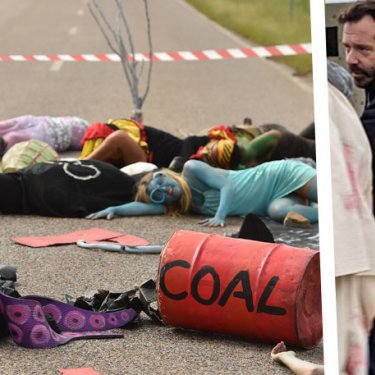French TV crew arrested while covering environmental protest in Australia

Reporters Without Borders (RSF) calls on the Australian authorities to drop all charges against four French TV journalists who – in an unacceptable attack on investigative journalism – were arrested today while filming environmentalists protesting at a coal terminal near the Great Barrier Reef in northeastern Australia.
The four journalists, who work for the French public TV channel France 2, were held for seven hours after being arrested at around 7 a.m. while filming two women protesters who had chained themselves to the rail line leading to the Abbot Point deep-water coal port in north Queensland.
The journalists – reporter Hugo Clément, producer Guillaume Dumant and cameramen Clément Brelet and Victor Peressentchensky – some of whom were handcuffed the time of their arrest, were charged with “trespassing” on the rail line although, unlike the protesters themselves, they were not on the line.
“The France 2 journalists were doing their job in a completely legal manner in a public space, so their arrest on this spurious charge was the kind of arbitrary procedure more typical of an authoritarian regime,” said Daniel Bastard, the head of RSF’s Asia-Pacific desk.
“We call on the Queensland authorities to immediately drop these absurd charges against the four journalists. Recent repeated press freedom violations in Australia raise questions about respect for the rule of law. If nothing changes, Australia has every chance of falling several places in RSF’s next Press Freedom Index.”
Reporting ban
The France 2 journalists were released on bail at around 2 p.m. pending a hearing scheduled for 3 September. The release order specifies that they are banned from being within 100 meters of any property owned by the Adani Group, the Indian transnational that owns the rail line and coal terminal, and within 20 km of the Adani Group’s Carmichael coal mile, 500 km south of Abbot Point.
“The link between our arrest and this ban is the Adani Group, which runs the mine,” Clément told RSF. “The police went straight for us this morning. They clearly didn’t want us filming the protest. And now we are banned from covering this story, which says a lot about the influence that big private-sector corporations wield.”
Adani launched the Carmichael mine in 2014 with the support of the federal and Queensland governments with the aim of turning it into the world’s biggest coal mine. It would take a heavy environmental toll because it includes the construction of a channel leading to Abbot Point that would destroy part of the Great Barrier Reef. The French crew was covering the story for “Sur le Front,” a France 2 series on environmental issues.
Major violations
Press freedom in Australia has been badly undermined in recent years by the concentration of private media ownership in ever fewer hands, impacting pluralism. It was dealt two major blows last month in the form of federal police raids on the home of a political journalist in Canberra and on the Australian Broadcasting Corporation’s headquarters in Sydney, in unrelated cases.
And it was reported earlier this month that the federal police had demanded that the Australian airline Qantas surrender its records of an ABC journalist’s travel arrangements as part of its investigation into a leak.
Australia is ranked 21st out of 180 countries in RSF’s 2019 World Press Freedom Index, two places lower than in 2018.



